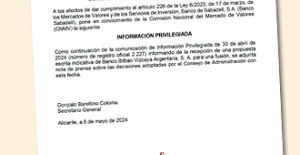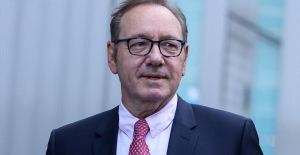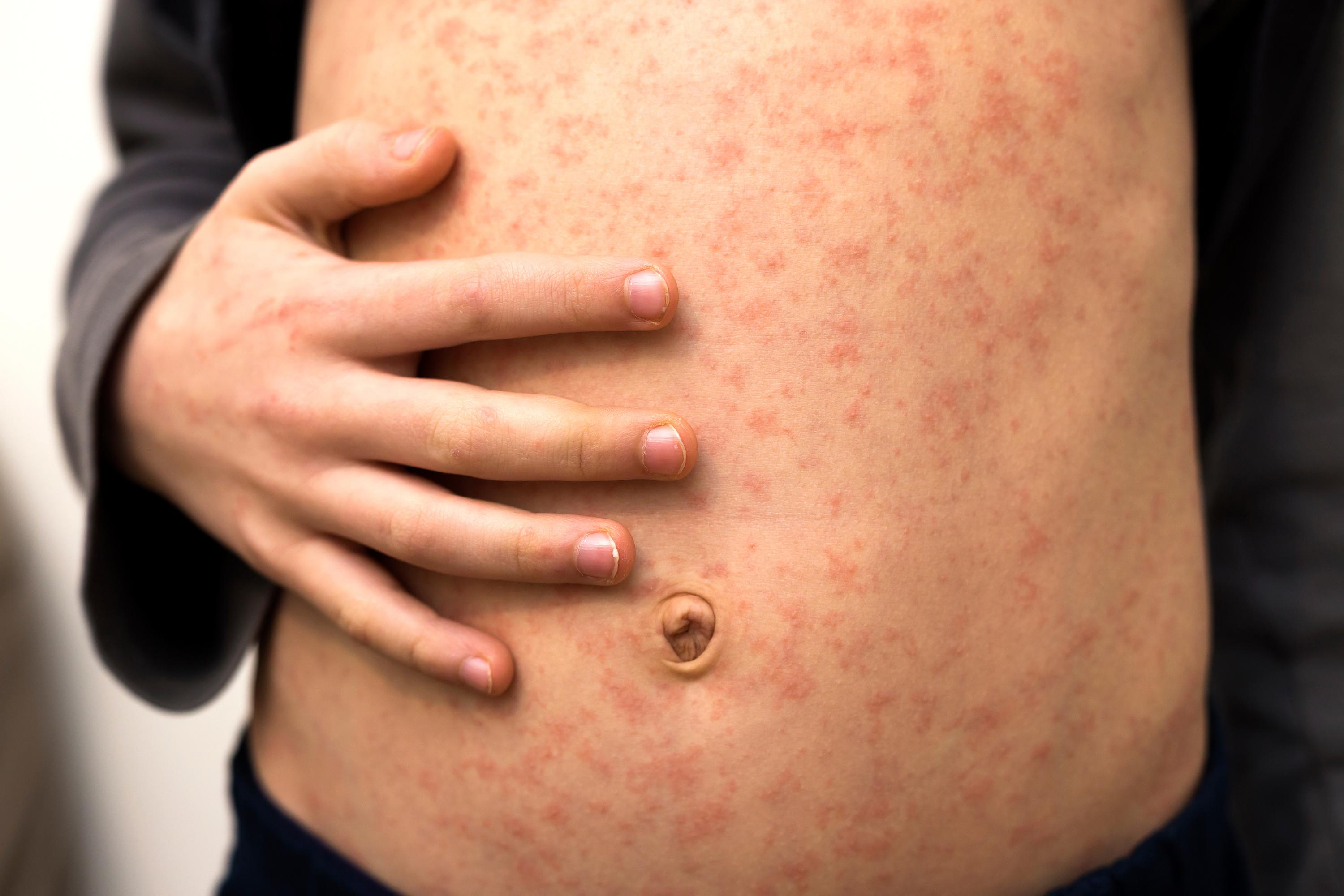This is “an alarming increase”, with more than 30,000 cases of measles reported by 40 countries between January and October 2023 in the Europe zone of the World Health Organization (WHO). That is to say a number multiplied by more than 30 compared to the whole of 2022, when 941 cases were notified. Enough to worry the WHO, which specifies that “the increase in the number of cases has accelerated in recent months, and this trend is expected to continue if urgent measures are not taken”. The WHO therefore calls for “vaccination activities (...) to be carried out urgently to stop transmission and prevent the spread”.
Especially since many of these cases are serious: nearly 21,000 hospitalizations and 5 deaths linked to the disease in 2 countries have been reported. The cases concern all age groups, but in 2 cases out of 5 they concern children aged 1 to 4 years, and in 1 case out of 5 adults aged 20 years and over. Most of the cases recorded with the WHO concern 4 countries: Kazakhstan (12,304 cases), the Russian Federation (6131), Turkey (4602) and Kyrgyzstan (3639).
This is not the first time that measles has made headlines in Europe: in 2018, 41,000 people contracted the disease, and 37 died. the WHO recorded nearly 89,000 cases in 2018, and more than 104,000 in 2019. The epidemic then declined thanks to the Covid-19 pandemic (between confinement, barrier measures, cessation of travel, but also probably less good monitoring of the situation by health systems overwhelmed by the epidemic...) to seem to almost disappear in 2021. But it seems to want to start again with a vengeance.
This resurgence, specifies the WHO, is “largely attributable to the decline in vaccination coverage (...) between 2020 and 2022”. The Covid-19 pandemic played a large part in this, adding to a growing mistrust of vaccines. Vaccination is however extremely effective, and with 2 doses, it can prevent almost 100% of cases. This is why its generalization gives hope for the eradication of the disease. Provided that the rate of vaccinated people is very high, at least 95%: measles is a very contagious disease through coughing, sneezing and nasal secretions, and it is estimated that one contaminated person can infect 15 to 20 more! According to the WHO, two-dose vaccination coverage in the Europe region increased from 92 to 91% between 2019 and 2022, and more than 1.8 million infants were not vaccinated. Vaccination coverage was only 80% (for two doses) in 2010, but it now seems to have stagnated since 2017.
“Vaccination is the only way to protect children against this potentially dangerous disease,” said Dr Hans Kluge, WHO regional director for Europe, in a press release. It is essential that all countries are prepared to detect measles outbreaks early and respond in time as they could jeopardize progress towards measles elimination.” In 1980, before the generalization of vaccination, the annual number of deaths linked to measles in the world was estimated at 2.6 million, indicates Vaccination info service.
In France, the figures for 2023 have not yet been published but Public Health France noted last June that the Covid-19 pandemic had allowed “a significant reduction in the number of cases declared since April 2020, followed by almost non-existent viral circulation in 2021 which continued throughout 2022”, unlike other respiratory viruses. The public health agency saw this as a success of “the observed improvement in 2-dose MMR vaccination coverage in infants born since 2018 who are subject to compulsory vaccination and, on the other hand, by the immunity acquired during during recent epidemics. Fifteen cases, including 5 imported, of this notifiable disease were recorded in the country in 2022, and no deaths reported.
However, even if the vaccination coverage rate necessarily benefited from the fact that vaccination was made compulsory, in the entire population “the objective of 95% vaccination coverage at two doses is not yet achieved and there persists insufficiently vaccinated populations, worries Public Health France, particularly among adolescents and young adults or even within particular populations far from the health system.

 Sabadell rejects the merger with BBVA and will fight to remain alone
Sabadell rejects the merger with BBVA and will fight to remain alone In Germany, the far left wants to cap the price of “doner kebabs”
In Germany, the far left wants to cap the price of “doner kebabs” Israel-Hamas war: Gaza between hope of truce and fear of Israeli offensive in the South
Israel-Hamas war: Gaza between hope of truce and fear of Israeli offensive in the South “Mom, Dad, please don’t die”: in the United States, a nine-year-old child saves the lives of his parents injured in a tornado
“Mom, Dad, please don’t die”: in the United States, a nine-year-old child saves the lives of his parents injured in a tornado The presence of blood in the urine, a warning sign of bladder cancer
The presence of blood in the urine, a warning sign of bladder cancer A baby whose mother smoked during pregnancy will age more quickly
A baby whose mother smoked during pregnancy will age more quickly The euro zone economy grows in April at its best pace in almost a year but inflationary pressure increases
The euro zone economy grows in April at its best pace in almost a year but inflationary pressure increases Children born thanks to PMA do not have more cancers than others
Children born thanks to PMA do not have more cancers than others “The prices are astronomical”: to enjoy the Olympics with family, Sabrina spent... 8,000 euros
“The prices are astronomical”: to enjoy the Olympics with family, Sabrina spent... 8,000 euros “House of the Dragon”, “Succession”… Max, the new streaming platform from HBO and Discovery, launched in France on June 11
“House of the Dragon”, “Succession”… Max, the new streaming platform from HBO and Discovery, launched in France on June 11 The A13 motorway will finally reopen this Friday, in one direction only
The A13 motorway will finally reopen this Friday, in one direction only TNT commission of inquiry: tensions between LFI deputies and Macronists before the vote on the report
TNT commission of inquiry: tensions between LFI deputies and Macronists before the vote on the report The Gaza War invites itself to the 2024 Pulitzer Prizes
The Gaza War invites itself to the 2024 Pulitzer Prizes Judith Godrèche presents a short film on sexual violence in Cannes
Judith Godrèche presents a short film on sexual violence in Cannes Kevin Spacey: new trial in sight in London for the American actor, for sexual assault
Kevin Spacey: new trial in sight in London for the American actor, for sexual assault Taylor Swift fans make London pub Black Dog their new place of pilgrimage
Taylor Swift fans make London pub Black Dog their new place of pilgrimage Omoda 7, another Chinese car that could be manufactured in Spain
Omoda 7, another Chinese car that could be manufactured in Spain BYD chooses CA Auto Bank as financial partner in Spain
BYD chooses CA Auto Bank as financial partner in Spain Tesla and Baidu sign key agreement to boost development of autonomous driving
Tesla and Baidu sign key agreement to boost development of autonomous driving Skoda Kodiaq 2024: a 'beast' plug-in hybrid SUV
Skoda Kodiaq 2024: a 'beast' plug-in hybrid SUV The home mortgage firm rises 3.8% in February and the average interest moderates to 3.33%
The home mortgage firm rises 3.8% in February and the average interest moderates to 3.33% This is how housing prices have changed in Spain in the last decade
This is how housing prices have changed in Spain in the last decade The home mortgage firm drops 10% in January and interest soars to 3.46%
The home mortgage firm drops 10% in January and interest soars to 3.46% The jewel of the Rocío de Nagüeles urbanization: a dream villa in Marbella
The jewel of the Rocío de Nagüeles urbanization: a dream villa in Marbella Institutions: senators want to restore the accumulation of mandates and put an end to the automatic presence of ex-presidents on the Constitutional Council
Institutions: senators want to restore the accumulation of mandates and put an end to the automatic presence of ex-presidents on the Constitutional Council Europeans: David Lisnard expresses his “essential and vital” support for François-Xavier Bellamy
Europeans: David Lisnard expresses his “essential and vital” support for François-Xavier Bellamy Facing Jordan Bardella, the popularity match turns to Gabriel Attal’s advantage
Facing Jordan Bardella, the popularity match turns to Gabriel Attal’s advantage Europeans: a senior official on the National Rally list
Europeans: a senior official on the National Rally list These French cities that will boycott the World Cup in Qatar
These French cities that will boycott the World Cup in Qatar “The future is for us”: “disappointed” and “proud” at the same time, Al-Khelaïfi sees the glass half full after the elimination of PSG
“The future is for us”: “disappointed” and “proud” at the same time, Al-Khelaïfi sees the glass half full after the elimination of PSG PSG: “Since January, these have not been my best matches,” agrees Zaire-Emery, who promises to “come back stronger”
PSG: “Since January, these have not been my best matches,” agrees Zaire-Emery, who promises to “come back stronger” “What is this question, honestly?” : Nasser Al-Khelaïfi (very) annoyed after PSG-Dortmund
“What is this question, honestly?” : Nasser Al-Khelaïfi (very) annoyed after PSG-Dortmund “I am the guy who has to score the goals”: Mbappé does not hide and assumes responsibility after PSG’s exit
“I am the guy who has to score the goals”: Mbappé does not hide and assumes responsibility after PSG’s exit


















